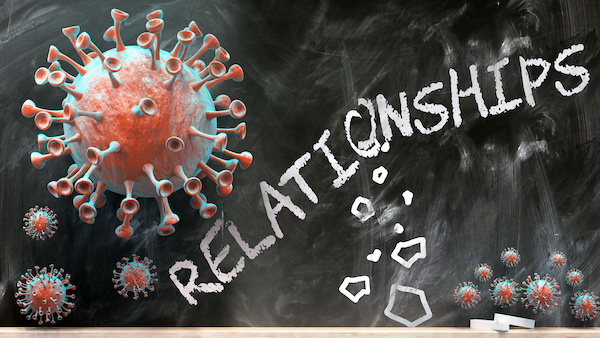Who knew back in March of 2020 that so many of us would still be hunkered down in our homes almost a year later? If you’ve been sharing your space 24/7 with a partner, all that togetherness may have strengthened your relationship. Or maybe it has pushed you both to the edge.

Photo by Elle Darcy
Kathleen Kane, who is a Licensed Marriage and Family Therapist at WellSpace Counseling Center in Portland and Yarmouth, Maine, says we are living in a unique time and tensions are especially high. Not only are we affected by a global pandemic, but it also occurred during a pretty contentious election period.
We don’t have the usual distractions or social outlets that may have helped keep us centered and calm in the past. Instead, we have other distractions (besides our partners) — working from home, schooling children, worrying about older parents and other loved ones, worrying about the future, whether we’ll still have a job or if we can pay our bills … the list goes on and on and on.
What is your role in the relationship?
Take a deep breath. Kathleen has some valuable tips that may, at least, help a foundering relationship. First of all, if you and your partner are both working from home and schooling your children, it’s important to have clarity about your roles and not take each other for granted. You want to be on the same page about the division of labor in terms of your individual work and family commitments.
It’s not necessarily I did this, so you do that and we go down the list and make sure it’s equal, it’s more that it feels fair. You need to be clear about what roles fall to whom because people usually have a preference about what they’re happy to do and what they really don’t like doing. Having a clear conversation about that can help avoid some of those feelings of I’m doing more than you.
Kathleen Kane, Licensed Marriage and Family Therapist
Say what you need
Kathleen also says it’s important for each partner to express what they need for personal time or time to connect as a couple — and to be heard.
When we’re very busy, the needs of the couple or the individual are the easiest things to throw on the back burner because they seem less urgent. I think it’s really important to make a deliberate effort to prioritize each other’s needs, even if it’s to go for a walk or talk to a friend on the phone for 10 minutes after dinner. Whatever it is that can nourish each partner a little bit needs to be brought into the daily schedule.
Kathleen
Now I understand
One of the positive outcomes of being in lockdown together is that it has allowed some people to have a better understanding of the scope of the other person’s day. For example, before COVID, couples may have gone their separate ways every morning and then carried the stresses of their day back into the home and the relationship in the evening. Without knowing what is going on for your partner, you may be apt to take something personally when it’s not meant to be or to make wrong assumptions.
That can lead to reactivity and conflict that may not even need to happen or have anything to do with the partnership.
Kathleen
When you actually witness what your partner may be up against, you have an opportunity for a meaningful dialogue.
Ask. Say this is what I’m observing — I think something is going on with you. Being direct doesn’t mean you are pursuing conflict. Observing can lead to realizing that maybe it isn’t about me. ‘I heard how stressful that conference call was. I see how much you’re doing with the kids in schooling and how stressful that is.’ To be able to be direct in a soft way helps to eliminate a lot of the misinterpretations that we may come up with.
Kathleen
Take a timeout
One of the big challenges is that when you’re feeling stressed or triggered it’s not always easy to communicate with compassion and respect and it’s usually difficult to hear what the other person has to say. It can be helpful to have an agreement ahead of time that in those moments, it’s ok to take an emotional timeout.
Timeouts are an acceptable way to save something until you’re in a better place to talk about it. Set a time limit. For instance, you could say I’m feeling overwhelmed right now and I am going for a drive, but I’ll be back in a half-hour, and we can talk about it. And in that time, instead of stewing over why you’re right and your partner is wrong, use it to distill what the core issue is that you want to communicate. The hope is that you’re looking at a disagreement as a place to get more information about the other person and about the relationship as opposed to proving that you were right to feel or say the things you did.
Kathleen
Older couples, too
Even if couples don’t have the added stress of working from home and taking care of/schooling children, their relationship may be feeling strained. Older couples may have long-established patterns that have risen to the surface during the pandemic.
It’s not unlike the quarantine couple who used to go to the office for eight hours a day and now they have to deal with each other all day. The older couple may have learned to live a little more separately and had fallen into a routine. Now they’re finding themselves back with each other without those same distractions.
Kathleen
Here, let me fix it
Some people have a hard time handling it when their partner is anxious or stressed and will try to fix it or come up with their own solutions.
They’ll tell them they shouldn’t feel that way or that everything will be fine. In that situation, I think it’s important to just listen and give the person the space to talk about it. You could even mirror back what they’re saying or what you’re observing. Say something like I can tell you’re stressed or you seem stressed. This isn’t something that one partner can resolve for the other and so, being able to support each other in that way is really important.
Kathleen
Relationship warning signs
Are there some warning signs that you shouldn’t ignore? Kathleen listed four behaviors identified by John Gottman, a well-known couples therapist, and his wife. They refer to them as the Four Horsemen.
- Criticism
- Contempt
- Defensiveness
- Stonewalling
Of course, there are going to be moments where you’re critical of your partner, but the idea is that when these four things exist in your daily back and forth with each other, it indicates a lack of connection, respect, and empathy, as well as an inability to put yourself in the other person’s shoes, and a real kind of isolation. It doesn’t mean your relationship is destined to fail, but pay attention if you notice any of them or if they are prevalent in your relationship.
Kathleen
Consider couples therapy
More and more couples have been reaching out for therapy lately. Kathleen says by the time they make that decision, even if it is difficult and uncomfortable, for the most part, individuals are hopeful that the relationship will work and they are willing to make the effort successful therapy requires. That includes looking at their own behaviors.
It can be difficult to acknowledge and take responsibility for your role in the dynamic. It can also be hard if you don’t think the other person will do the same. You attend therapy sessions, but then you have to practice the things we talk about in the session. It’s a commitment.
Kathleen
Encouragement and compassion
Whether you decide to try therapy or not, if your relationship has suffered this past year and you want to turn things around, Kathleen’s last piece of advice is to slow down and really try to appreciate each other.
It may help to deemphasize some of the behaviors that we think are really important when we’re caught up in them. This is a very unique time, but if it’s possible, try to use it to strengthen your relationship, to be more deliberate about how you communicate, to be conscious of how you’re emotionally responding to your partner, and to identify how you’re feeling so you can communicate that information to your partner. Compassion is also a huge part of this. Try to really understand who your partner is and why they may, in the moment, react a certain way and approach them from a place of compassion. Being aware of all of these things can help strengthen the connection between the two of you.
Kathleen


This was wonderful. Kathleen’s advice needs to find a larger audience.